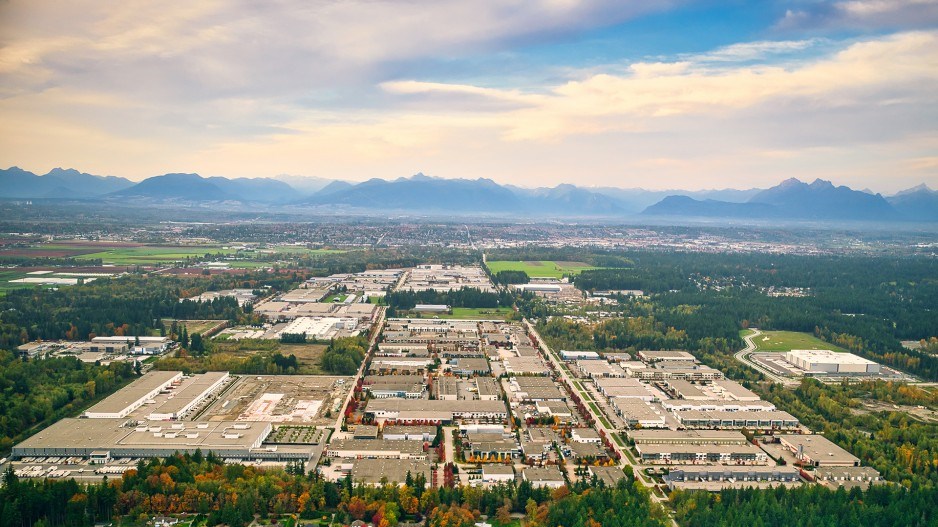Surrey is an increasingly desirable industrial market for companies looking to secure space in Metro Vancouver.
As the region continues to grapple with a shortage of industrial real estate, new developments and new land opportunities in Surrey are offering some relief, according to those who spoke to BIV.
“The reality of Vancouver being as tight in the industrial market as it is, is that any space that is built will be absorbed,” said Pat Phillips, senior vice-president with investment management company Colliers.
“The market is so tight that you see companies looking elsewhere for space; whether it’s Calgary, south of the border or other secondary markets. In Surrey, we’ll continue to see lots of absorption in there.”
Surrey accounted for 15 per cent of the region’s industrial inventory in the first quarter of 2014 – a share that has risen to 18 per cent, as of the second quarter of this year, according to Avison Young.
Of the square footage under construction in the region’s top five industrial markets, Surrey accounts for 17 per cent – or nearly 1.4 million square feet – of the 7.3 million square feet of space being built, according to Colliers.
“It comes down to the developable land opportunity. There are so many markets in Metro Vancouver that are restricted … with mountains, border, ocean and the ALR (agricultural land reserve) which really restricts your ability to grow your industrial base,” said Blake Asselstine, executive managing director and managing principal with commercial real estate company Cushman & Wakefield.
“Surrey has done a great job in bringing out new land, predominantly [in] the Campbell Heights area.”
Asselstine said that while Surrey is leading in terms of development opportunity, Richmond has the most inventory of markets in the region, with more than 45.4 million square feet.
Surrey is in second at approximately 37.65 million square feet, but it also has the region’s highest industrial vacancy rate: Two per cent in the second quarter of this year, according to Avison Young and Cushman & Wakefield.
Richmond’s vacancy rate was roughly 0.5 per cent during the same period, while Metro Vancouver recorded a vacancy rate of one per cent in the same quarter.
Areas such as Richmond and Delta are primed to serve companies exposed to in port-related business. Part of Surrey’s offering is labour and housing, says Garth White, a real estate broker with Avison Young.
“Previously, a lot of the decision making around real estate was around location and Richmond is an excellent location,” he said.
“What we’ve seen is a shift towards labour, which is probably the key piece businesses are looking for, and Surrey offers an excellent demographic of labour for industrial businesses. Then it ties into affordability, for industrial space but residential as well for people to live.”
The Campbell Heights industrial and business park area makes up 32 per cent of Surrey’s inventory, or six per cent of Metro Vancouver inventory, as of Q2 2023, according to Avison Young.
The area has driven Surrey’s industrial availability, according to those who spoke to BIV.
“That was the only area that actually had development land for the last decade or so. That development land has almost completely been swallowed up and developed,” said Phillips.
Campbell Heights has delivered roughly 30 per cent of Metro Vancouver’s new industry supply between 2018 and 2022.
Located in south-east Surrey along the city’s border with the Township of Langley, the industrial and business park spans 768.9 hectares with more to come.
There is an additional leasing opportunity at the Campbell Heights West Business Park, created by real estate development company Onni Group and located next to the original Campbell Heights development. It is advertised as benefiting from a labour pool from Surrey, Langley and White Rock.
The City of Surrey is also in the second stage of the local area plan process to add an additional 245 hectares for the new South Campbell Heights.
“Assuming it goes through, there’ll be a little bit of development land for the next five to 10 years that can be used in Surrey. If that doesn’t go through, then Surrey is like everywhere else, it’s out of development land for the foreseeable future,” said Phillips.
There have been 135 businesses and companies who expressed interest in moving into space within the industrial park once it is available, according to a Surrey Board of Trade (SBOT) press release expressing support for the project.
SBOT estimates that up to 20,000 jobs could be created through employment on the land.
The plan to add more industrial space through South Campbell Heights was met with opposition from the Semiahmoo First Nation and some environmental groups. Despite objections, Metro Vancouver approved the plan to turn the rural lands into the industrial park, which is located next to the Little Campbell River watershed.
It is expected that Campbell Heights, including South Campbell Heights, will be fully built in 11 years, according to Avison Young.
Once completed, it could account for 10 per cent of Metro Vancouver’s total industrial inventory, if the regional market’s annual growth remains at two per cent, where it has been for the past eight years, according to Avison Young.




